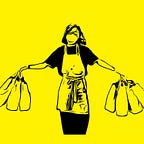Derek, Head of Business Development at Purslane, Brooklyn
By Stephanie Garr
Shift Change tells the stories of ordinary people on the frontlines during a transformational period in American life. The goal of this project is to raise funds for Supply Drop Brooklyn, a charitable organization that partners with local restaurants to deliver meals to healthcare workers at affected hospitals. Your help can make a critical difference. Please visit Supply Drop and learn how you can make a contribution. For more information about this project, check out our About page.
Derek is the head of business development for the sustainable catering company Purslane in Brooklyn. This is his story.
What is your profession?
I actually just started a new job when quarantine started. I had been working as the assistant GM of a restaurant here in New York City. Then, about three weeks ago, I started working for Purslane, which is a carbon neutral and zero-waste catering company, part of a sustainable hospitality group called The Oberon Group. The group also has three concepts in Brooklyn, wine bars Rhodora and June, and a Northern Italian-inspired restaurant Rucola. I was brought on board to do business development, but with the timing, that kind of turned into business survival. Instead of focusing on ways to grow our business, I was tasked with figuring out how to keep our operation afloat while helping out the most people possible — our employees, healthcare workers, and our community. Since I started, we’ve been reaching out directly to hospitals and nonprofits, just letting them know that we have a huge kitchen, we’re experts at safely preparing food at scale, and we’d be happy to get involved with their efforts.
How has your life changed since the coronavirus struck?
I’m lucky, I have a really strong support system here with amazing friends and family. I was working at a restaurant with so many people living paycheck to paycheck and all of a sudden, the week I left, we had to close our restaurant. I just remind myself how fortunate I am to be in a position where someone had a job for me to do, period. Joining Purslane at this time has been really interesting. It’s been gratifying to form these partnerships and to do meaningful work during a crisis. We’ve had to look everything over with a completely fresh perspective on what we should be doing and how we can be doing it best and most efficiently.
How has this changed your view of your profession and larger community?
I grew up in hospitality. My family’s been in it for generations. At the end of the day it’s about taking care of people. You’re a home away from home for people and you’re doing it because you love forming genuine relationships. You love being there for people. It’s been eye-opening to see how many amazing people are in the hospitality community and the selfless acts and sacrifices they make on top of everything they have going on in their own lives. If anything, it’s made me appreciate the people I know in this industry that much more, and has reminded me why I’m in it.
How do you think this crisis will change the hospitality industry going forward?
This has shown us how many people are involved in the industry, millions of people, and how the vast majority of them don’t have any sort of safety net. This industry can’t move forward without some sort of structure put in place to ensure that people have the support they need and deserve in times of crisis — whether it’s a global crisis like we’re in now, or even on a personal level.
What is the most difficult and frustrating part of this for you?
We’re putting out hundreds of meals every week, but we have the capacity to do so much more. I’d love to see some sort of system put in place where, should a crisis arise, there’s this existing network of food handlers like ourselves that can do food at scale, have safe practices, and create food that is healthy and nutritious. It just seems wild that we’re doing so much outreach and there isn’t some sort of government entity to say, “Well, all right, this is what they can do and this is where we need their help the most right now.” Hopefully the progressive, forward-thinking minds of our incredible non-profits find their way into bureaucracy one day!
What are your hopes for today and for the future?
I hope people remember why they missed going to restaurants and reflect on hospitality in general. I think, especially here in New York City, we get wrapped up in whatever is trendy and what’s new and what’s hot. But once you find a place that you love and you connect with, you go there because of the people who work there and the feeling that it gives you. I hope this gives people the opportunity to reflect on that and inspires them to show their love and appreciation to those people who work in these places when they finally get a chance to go back. It’s emotionally, intellectually, and physically demanding. The people who really love hospitality are putting everything they have into every shift they take. Hopefully people realize how meaningful these places are to them.
What are you listening to? What sort of music helps you feel better during this time?
If I want to just chill and nod off and feel good, I’m listening to Vampire Weekend’s latest album [Father of the Bride].
